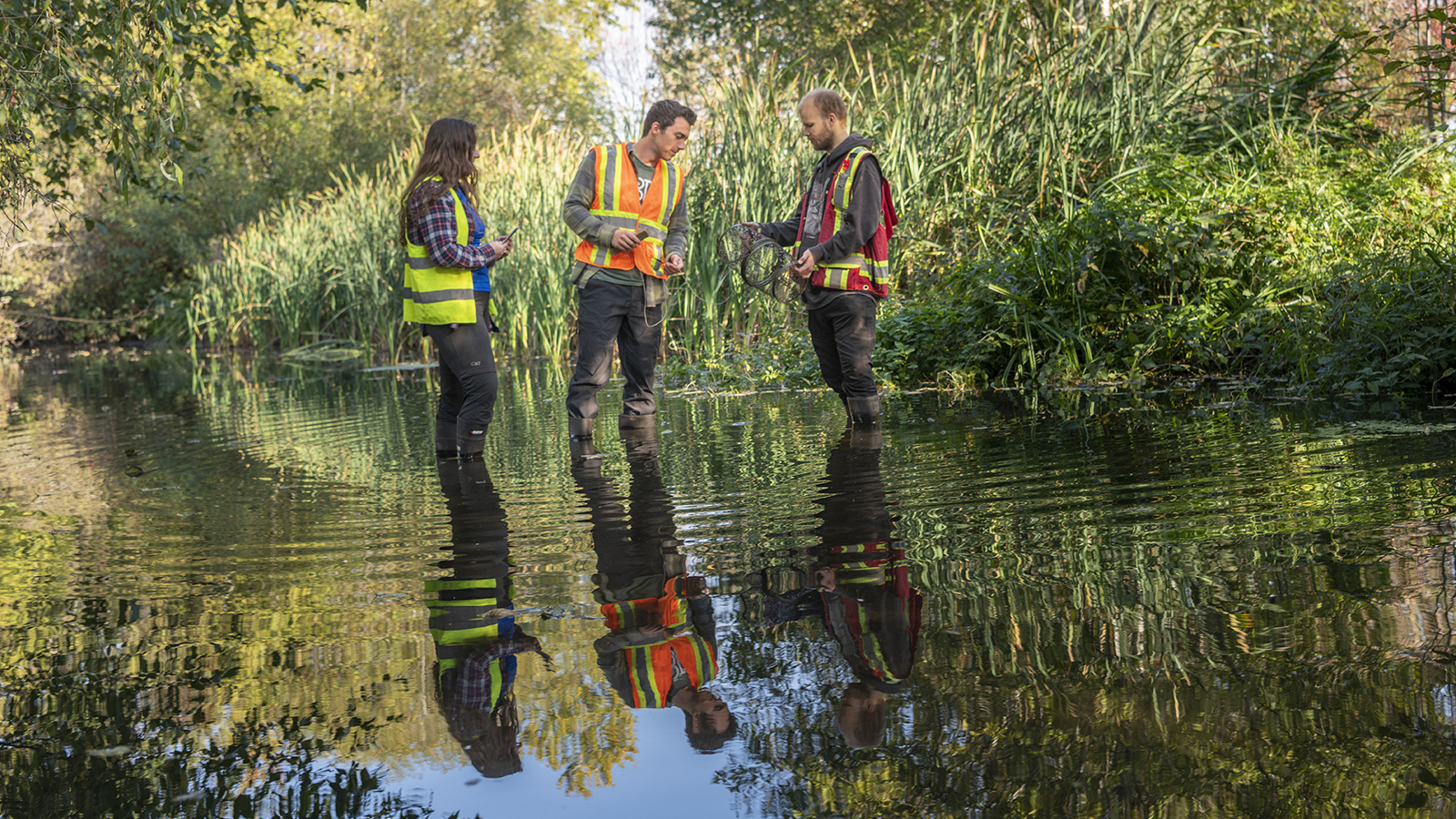Each year, the world comes together on Earth Day to draw attention to our collective responsibility and help accelerate the transition to an equitable, prosperous green economy. BCIT shares this commitment. Our Sustainability Vision aims to enable people to live socially-just lives within ecological limits. To mark this worldwide event, here are nine highlights on how BCIT is making sustainability a top priority.
1.) BCIT is recognized for its success in achieving Sustainability Goals
BCIT was recognized as a top performer in the 2022 Sustainable Campus Index as well as by the CICan ImpAct-Climate project. Sustainability is embedded in everything we do at BCIT. The recognition acknowledges the many ways that BCIT is addressing our sustainability goals through education, operations, and community engagement.
2.) BCIT’s award-winning Fireweed podcast presents students, academics, and thought leaders who are working to create resilient systems
Now in its second season, the podcast looks at topics such as how the regenerative travel movement aims to encourage travellers to leave their destination better than it was before, how to make flight sustainable, and how we can build climate-resilient communities.
Listen to Fireweed on Apple Podcasts, Google Podcasts, and Spotify or wherever you get your podcasts.
3.) New BCIT Health Sciences Centre (HSC) is a healthy and sustainable space for educating healthcare professionals
The HSC is built to WELL Building Gold Standard, an international designation that recognizes buildings that are thoughtful and enhance human health and wellbeing. The HSC also includes many sustainable features, like an efficient heating and lighting system, bicycle storage and shower amenities to support those who bike, as well as 60 electric vehicle (EV) charging stalls — a project which received funding from Natural Resources Canada.
4.) BCIT students collaborate with YVR Innovation Hub to develop IoT water monitoring station
BCIT Centre for Internet of Things (IoT) led a group of 40 students in collaboration with the YVR Innovation Hub to help build a water monitoring system that collects and analyzes water quality in the channels around the YVR airfield. Monitoring the watershed off Sea Island will enable YVR to improve the modelling of the airfield and provide diagnostics and predictive insight as part of the airport’s need to address climate change and rising sea levels.
5.) An investment in mass timber education that supports clean growth
According to Seagate President and BCIT alum Scott Comfort, mass timber is key to the future of sustainable construction. Mass timber is a sustainable building material that is engineered by fastening multiple layers of smaller-dimension wood together with glue, dowels, or nails. These timber products are solid, structural load-bearing components, such as columns, beams, and panels used to construct residential, commercial, and industrial buildings. The growing mass timber sector will support more than 4,000 jobs in manufacturing, technology, forestry, design, and engineering, and bring new jobs to communities throughout the province.
These environmental studies can help you get a green job in Canada
6.) BCIT SMART researchers expand its electric vehicle education globally
Countries worldwide struggle to keep up with the global shift to EV adoption. Communities face barriers, ranging from the technologies that support EV adoption, to the fundamentals of how EV work. The BCIT Smart Microgrid Applied Research Team (SMART) was commissioned by a group of business leaders in Jamaica to develop and deliver a short course on the fundamentals of EV, EV charging, and the technologies that support them.
7.) BCIT opens Indigenous Garden at Burnaby Campus
The tiered garden in the courtyard, between SW1 and SW3 on the Burnaby Campus, provides a dedicated area to cultivate a range of Indigenous plants and is also built to be a peaceful green space for students, faculty, and staff to enjoy. The development of the garden was a collaboration between a range of campus partners, including Indigenous Initiatives and Partnerships, Facilities and Campus Development, School of Construction and the Environment, Student Life, Applied Research, Student Financial Aid and Awards, International, and BCIT Student Association, who are part of the BCIT Food Security Working Group – a multi-stakeholder platform committed to engaging in the promotion of food security resources on-and-off the BCIT campus.
8.) Ocean Protection Plan provides investment in marine training for Indigenous Peoples, Northerners, and women
With more vessels and goods being transported on Canadian waters than ever, investing in a strong, diverse, and skilled marine workforce along our coasts is critically essential. This renewed funding from the Ocean Protection Plan will support the capacity of partner institutions, like BCIT, to deliver marine training courses, create a safe learning environment and equitable work culture for its students, and increase diversity and recruitment—resulting in more skilled workers entering the Canadian marine industry. The training supported by the Oceans Protection Plan will keep our oceans and coasts healthy, advance reconciliation, and build a clean future for our children and grandchildren.
9.) New BCIT Wood Waste to Energy Centre will reduce GHG emissions
BCIT has opened a new $1.5 million Wood Waste to Energy Centre at its Burnaby Campus which uses a biomass boiler to recycle wood waste into clean energy. Every year, the Centre will use 250 tons of wood cut-offs and sawdust from Carpentry and Joinery programs to heat buildings at the Burnaby Campus. Not only will the facility reduce GHG emissions, it will also divert wood waste from the landfill. This Centre shows the commitment of BCIT in addressing the sustainability challenges we face here on campus, across BC, and around the world.
Have you subscribed? Sign-up to receive the latest news on BCIT.
